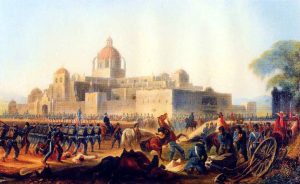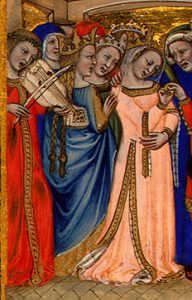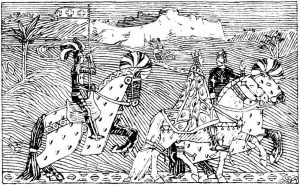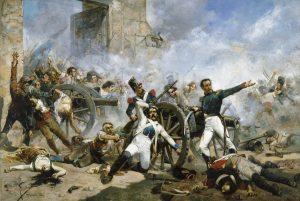
A Traitor’s Justice: The Execution of the St. Patrick’s Battalion in the Mexican-American War, 1847
Despite overtures to the Catholic Church by American political and military leaders during the Mexican-American War (1846-1848), the need to enforce discipline in theater was paramount to the U.S. Army’s success. When more than seventy Irish-American deserters, known as the Saint Patrick’s Battalion (San Patricios), were captured by U.S. forces in late August of 1847 following the Battle of Churubusco on the outskirts of Mexico City, they were summarily court-martialed. The former U.S. soldiers had been induced by Mexican incentives of free land and money to switch sides and fight for Mexico. Eventually their numbers reached a few hundred. They also fought well and were therefore doubly hated by U.S. Army officers. In contrast, the San Patricios are remembered as heroes in Mexico.
Read More
Medieval Dresses: The Mirror of Medieval Society
There are many ads on the internet offering medieval dresses for sale. That means they are quite popular and have their fans that like to buy them and wear them on certain occasions. What are the reasons for such a fascination with medieval dresses? Well, everyone has their motives, but it’s definitely interesting to immerse in the medieval era and see that medieval dresses weren’t just clothes. Wearing a certain dress meant much more. A dress was a status symbol that defined a woman and who she was. Wearing a certain dress meant showing within which class you belong and how rich and powerful your family was. But, “medieval fashion” was also a reflection of the whole political and social situation during the Middle Ages.
Read More
Norway’s King Sigurd the Crusader, 1089-1130AD
There were numerous Christian crusades to the Holy Land but one of the more fabled was the Norwegian Crusade. Led by King Sigurd I Magnussen (Sigurd the Crusader) in 1107, the three-year crusade was the first led personally by a European king.
Read More
Conquer and Divide: The Spanish Resistance that Broke Napoleon’s Second Strategy
Although he was a brilliant military tactician, one of the ways Napoleon managed to hold on to conquered regions was by employing a strategy of carving up states based on historical precedent. The Rhodanic Republic (1802-1810), the Kingdom of Italy (1805-1814), and the Republic of Danzig (1807-1814) were among a few “sister republics” created by Napoleon. These client states, formed under the guise of revanchist history, aided the control of occupied lands in the First French Empire. When Napoleon invaded Spain in 1808, he set about to redraw its map in a similar fashion.
Read More
Cold War Propaganda: Three Ingredients For A Winning Strategy
During the Cold War years, the radio as a propaganda tool had a very important role. Popular in the bigger or smaller communities, it was an optimal medium for the Soviet government to send a political message. But, the political propaganda plan wasn’t only limited to the Soviet Union. It included the whole Iron Curtain.
Read More